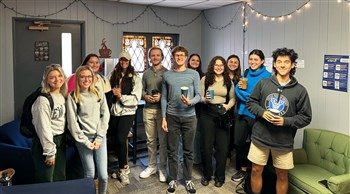When Trinity United Methodist Church offered pizza parties to the college students next door, nobody came.
But when the congregation offered free, strong coffee with seven kinds of sweeteners every day from 7:30 a.m. to 6 p.m., students from Tennessee Wesleyan University came to the church in droves.
West Trinity United Methodist Church is a part of the Holston Annual Conference.
Four years after the Rev. Skip White was appointed to Trinity, located next to the Tennessee Wesleyan campus, the church is pouring 15 gallons of coffee a day and opening the doors wide to students looking for a place to study, chill with friends, or worship.
White says he remembers the “level of discouragement” in his church members’ voices when they told him, in 2019, that pizza parties weren’t helping them connect to the 1,100 students attending college classes just a few steps away.

“They had no connection to the university or any young adult or college ministries, which is hard to believe when you consider the church’s location,” White said. “They wanted the connection, but they didn’t know how to make it happen.”
White suggested a coffee ministry, which was set up as “Trinity Coffee” in a room (former music director’s office) just inside a door of the church facing the campus. The church also renovated several parts of the building, removing cluttered shelves to show off stained glass windows and cozying up the walls with muted paint shades and reclaimed wood.
To reach the students, White told his congregation, “We have to serve coffee every day for five years … but I didn’t think it would take off as quick as it did.”
As the word about free “Trinity Coffee” spread through campus, students made it part of their routine to slip inside the side door of the church for a shot of caffeine.
“You can’t imagine what a blessing it is when you realize you’ve been up all night studying, and you know where to get coffee early in the morning,” said Brooklyn Ingram, a sophomore from Sweetwater, Tennessee, who leads campus tours for the university and mentions the coffee ministry to visitors. “We work long hours – it’s not nine to five here. So it’s nice to go [to Trinity] and have a little pick-me-up.”
When it’s finals week, Jozlyn Long said she drops by Trinity as many as three times a day. A sophomore from Friendsville, Tennessee, Long said her beverage of choice is iced coffee with a shot of caramel – “and vanilla, when I’m feeling extra.”
In the first year, the students drank up about five gallons of coffee a day, five days a week, 24 weeks out of the year while school is in session, said White. This year, as whole teams of athletes have discovered that Trinity is the place to go, the demand is at least 15 gallons a day, with about 3,000 cups provided each semester.
Three years ago, Zane Markow discovered that Trinity United Methodist Church was the perfect place to drink coffee and study early in the morning. “It’s like any church, it’s got that calm, settled-down atmosphere,” he said.
White noticed how faithfully Markow came every morning and enlisted him as a volunteer to open the church, make coffee and set up from 6 to 6:45 a.m. So for the last three years, that’s what Markow has done, every day, without pay, without credit.
“It’s gotten into a habit that I get up early, do a devotion, take my vitamins and then go make coffee. That’s how my day starts,” says Markow, a junior, cross-country runner, and Seventh-day Adventist from Apison, Tennessee. “I’m just helping Skip out because he’s helping us out. I’m doing my little part.”
White says the coffee ministry is now “student-led and student-run,” with a different student, Eddie, closing shop and locking up every evening. However, church members bake cookies for the ministry, and White buys creamers and sweeteners every day to keep it stocked. (The coffee is ordered in bulk.) The total cost to the church is about $120 a week or $3,500 a year, included in the church budget.
“It’s not a cost, it’s an investment,” says White, who was appointed Tennessee Wesleyan chaplain in 2020, in addition to pastoring Trinity. “I tell people it’s about $500 a month, enough for your church to have a thriving college ministry. I would think that’s a bargain.”
White has plenty of opportunities to engage with his coffee consumers, as they study or congregate in the church or when they worship during the 11 a.m. chapel service on Thursdays. About 40 to 60 students participate in the Thursday service along with a student praise band. (“Thursday is a heavy coffee-drinking day,” the pastor says.)
About 10 to 20 students join in Sunday 11 a.m. worship, which has an average total attendance of 70 to 100, White said. “I’m proud of the church for owning this ministry. They’ve just gotten behind this and they’re so excited about it.”
The ministry helps define the grace of Christ that Trinity United Methodist Church is trying to represent to the students, at a time when the church does not always show its best side.
“Free coffee, consistently, given for them. What better metaphor?” White said. “That’s what these students are learning about the church. That’s the ministry we’re doing here. We’re changing people’s hearts and minds about the church and asking nothing in return.”
story by Annette Spence, editor of The Call, the Holston Conference newsletter.
This story represents how United Methodist local churches through their Annual Conferences are living as Vital Congregations. A vital congregation is the body of Christ making and engaging disciples for the transformation of the world. Vital congregations are shaped by and witnessed through four focus areas: calling and shaping principled Christian leaders; creating and sustaining new places for new people; ministries with poor people and communities; and abundant health for all.





